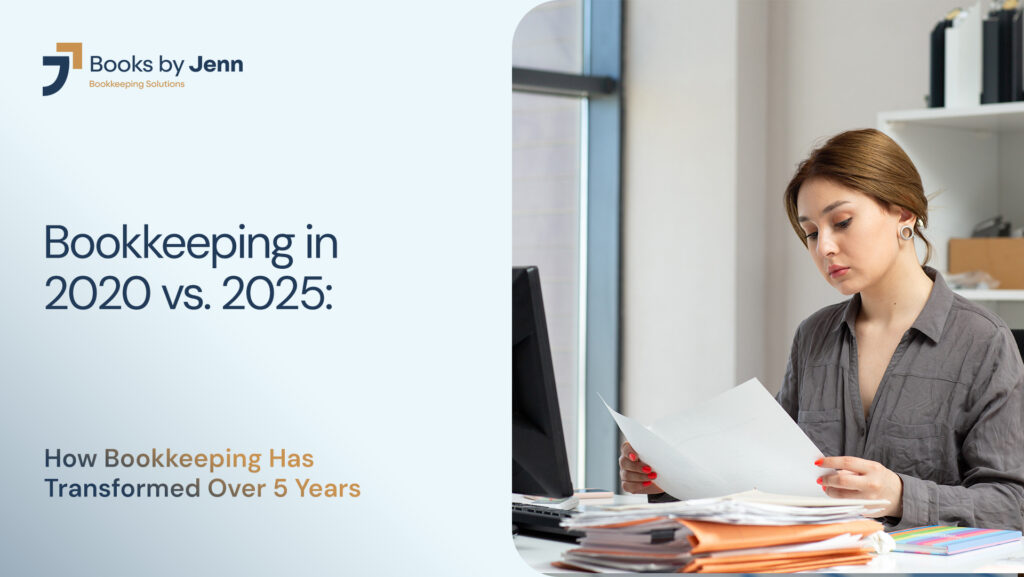California’s bookkeeping has undergone significant changes over the past five years. In 2020, bookkeeping was still viewed by many small business owners as a back-office chore a necessary task for taxes and compliance.
However, by 2025, it had evolved into a real-time decision-making system that drives growth, not just record-keeping.
If you’ve ever wondered whether bookkeeping is still relevant or how to move from spreadsheets to cloud-powered systems, this post connects all the dots. Let’s unpack what changed between 2020 and 2025, why it matters for small businesses, and how you can take action today, especially if you’re running a small business in Woodland, Davis, or anywhere in California.
From Manual to Real-Time: The Five-Year Fast Forward
Back in 2020, most small businesses relied on desktop software, manual spreadsheets, and infrequent reconciliations. Bookkeeping felt reactive, something you caught up on every few weeks.
Today, cloud-based bookkeeping services and AI automation tools have made financial management proactive, predictive, and far more powerful. Real-time data is now the baseline. Reports that once took weeks can now be generated instantly, helping business owners make smarter decisions and forecast growth with accuracy.
The bookkeeper’s role has shifted too — from data entry to strategic financial advising.
What Bookkeeping Looked Like in 2020
In 2020, the typical small business used tools like QuickBooks Desktop or spreadsheets. Data entry was manual, reconciliation was delayed, and missing receipts were common.
Bookkeeping was primarily treated as a compliance function, aimed at satisfying IRS or state tax deadlines. Many businesses underestimated its value.
Then the pandemic hit, accelerating the shift to digital systems. Remote work forced entrepreneurs to explore cloud accounting and virtual bookkeeping services, setting the stage for today’s transformation.
2025: The New Era of Bookkeeping
Let’s look at the trends that define bookkeeping in 2025 and how they impact small businesses across California.
1. Cloud-Native Bookkeeping Is the New Normal
Tools like QuickBooks Online and Xero have replaced desktop systems. Cloud bookkeeping offers instant access, automatic backups, and secure, encrypted data that is a major step forward for compliance with both GAAP and the California Franchise Tax Board (FTB).
Businesses in California can now collaborate with bookkeepers without ever exchanging paper files.
2. Automation Reduces Manual Work
AI-driven automation tools handle tasks like transaction categorization, invoice tracking, and reconciliation. Firms using automation report up to 40% faster monthly closes and fewer human errors.
The best part? Business owners regain time to focus on growth while maintaining financial accuracy.
3. AI Is the Silent Partner
Artificial intelligence is now embedded in every stage of bookkeeping, from predictive analytics to error detection. According to Karbon, firms that integrate AI experience measurable improvements in both accuracy and turnaround time.
Modern bookkeeping software even flags anomalies automatically, giving business owners financial insight that once required a full accounting team.
4. Virtual Bookkeeping & Outsourced Services
Virtual bookkeeping has redefined how small businesses manage finances. Instead of searching for a “bookkeeper near me,” entrepreneurs now hire remote bookkeeping services online, often saving up to 50% in overhead.
Businesses looking for expert support can rely on BooksbyJenn, a trusted bookkeeping company in Woodland, CA, offering outsourced bookkeeping and cloud accounting for small businesses across California. Yes, I’m talking about myself but with 15 years of experience, I can surely ease your system.
5. Real-Time Financial Data Means Smarter Decisions
Today’s business owners can see live dashboards showing cash flow, profit margins, and forecasts. This visibility enables them to adjust spending or strategy instantly — something unimaginable in 2020.
Bookkeeping’s Data-Driven Evolution
Here’s what the data reveals:
- Cloud adoption is mainstream. SMBs are running most of their financial workloads online.
- Automation pays off. Firms using automation report up to 90% fewer manual errors.
- Digital gaps persist. QuickBooks research shows 40% of small businesses still struggle with outdated software.
- Jobs are evolving. The Bureau of Labor Statistics (BLS) reports rising demand for cloud-savvy bookkeepers.
The message is clear: those who adapt to modern technology thrive those who resist, risk falling behind.
What This Means for Small Business Owners
If you’re running a small business in Woodland, Davis, or anywhere in California, this evolution presents an opportunity.
Stop viewing bookkeeping as paperwork. Think of it as your financial GPS a system that helps you identify trends, avoid cash shortfalls, and make informed decisions.
Here’s your five-step plan for smarter, modern bookkeeping:
- Audit your current system — identify what’s still manual.
- Go cloud-first — switch to QuickBooks Online or Xero.
- Turn on automation — let software handle repetitive tasks.
- Hire a professional — partner with BooksbyJenn, a local bookkeeping expert in Woodland, CA.
- Schedule monthly reviews — turn data into insights.
Want to work with a professional bookkeeper for your Davis small business? Check out our Bookkeeper for Davis, CA page for personalized help.
Is Bookkeeping Still Relevant in 2025?
Absolutely. While AI and automation handle routine data tasks, human expertise remains vital for interpretation, compliance, and strategy.
A modern Certified Public Accountant (CPA) or bookkeeper doesn’t just manage books, they translate numbers into business decisions. The tools changed, but the mission hasn’t. Partner with BooksbyJenn, your trusted bookkeeping company in Woodland, CA, serving clients in Davis and across California.

